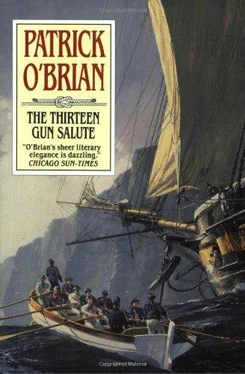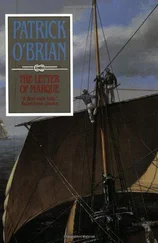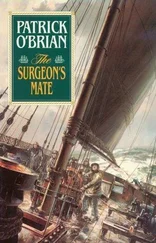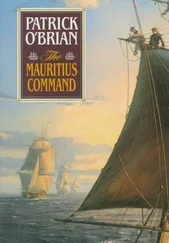Patrick O'Brian - The Thirteen Gun Salute
Здесь есть возможность читать онлайн «Patrick O'Brian - The Thirteen Gun Salute» весь текст электронной книги совершенно бесплатно (целиком полную версию без сокращений). В некоторых случаях можно слушать аудио, скачать через торрент в формате fb2 и присутствует краткое содержание. Жанр: Книги. Описание произведения, (предисловие) а так же отзывы посетителей доступны на портале библиотеки ЛибКат.
- Название:The Thirteen Gun Salute
- Автор:
- Жанр:
- Год:неизвестен
- ISBN:нет данных
- Рейтинг книги:4 / 5. Голосов: 1
-
Избранное:Добавить в избранное
- Отзывы:
-
Ваша оценка:
- 80
- 1
- 2
- 3
- 4
- 5
The Thirteen Gun Salute: краткое содержание, описание и аннотация
Предлагаем к чтению аннотацию, описание, краткое содержание или предисловие (зависит от того, что написал сам автор книги «The Thirteen Gun Salute»). Если вы не нашли необходимую информацию о книге — напишите в комментариях, мы постараемся отыскать её.
The Thirteen Gun Salute — читать онлайн бесплатно полную книгу (весь текст) целиком
Ниже представлен текст книги, разбитый по страницам. Система сохранения места последней прочитанной страницы, позволяет с удобством читать онлайн бесплатно книгу «The Thirteen Gun Salute», без необходимости каждый раз заново искать на чём Вы остановились. Поставьте закладку, и сможете в любой момент перейти на страницу, на которой закончили чтение.
Интервал:
Закладка:
IT IS WITH A CERTAIN RELUCTANCE that I write about myself, in the first place because such an exercise is very rarely successful, and even when it is, the man does not often coincide with his books, which, if the Platonic 'not who but what' is to be accepted, are the only legitimate objects of curiosity. In the second, because privacy is a jewel; and not only one's own privacy but also that of one's friends, relatives, connexions. Then again it seems to me that confusing the man seated at his table and writing what he means to make public with the person of the same name engaged on some entirely private occupation is quite wrong; while doing so sheds no real light upon the heart of the matter. Who for example would suppose that the Boswell who emerges from the endless working-over of his personal papers was capable of writing a very fine book?
I felt this more strongly when I was young, and when Rupert Hart-Davis asked me to write the blurb for a collection of my short stories I ended it by saying:
As for the personal side, the Spectator for 1 March 1710 begins, 'I have observed, that a reader seldom peruses a Book with much Pleasure, till he knows whether the Writer of it be a black or a fair Man, of mild or choleric Disposition, Married or a Batchelor, with other particulars of the like nature, that conduces very much to the right understanding of an Author.' To gratify this curiosity, which is so natural to a reader, we may state that Mr O'Brian is a black man, choleric and married.
That pleased me at the time, but now it seems perhaps rather overdone; and no doubt there is an ill-defined zone between the public and the private that can be spoken of without egotism; so since the British Library has paid me the very high compliment of producing this bibliography, I will, if I may, say something about the background of the books which it records with such meticulous accuracy.
I shall not deal with my childhood and youth in any detail, however: although the period had its compensations it is not one that I look back upon with much pleasure, partly because my home fell to pieces when my mother died a little after the end of the 1914-1918 War, so that I was sent to live with more or less willing relatives in Connemara and the County Clare and with some family friends in England, and partly because much of the time I was ill, which was not only disagreeable in itself but which also did away with much in the way of regular education and companionship. Fortunately there was a governess, dear Miss O'Mara, and some tutors whom I shall always remember with gratitude: even more fortunately most of these long stays in bed were spent within reach of books, and I read endlessly. Not that I was a chronically bedridden invalid or anything like it - I did go to school from time to time but upon the whole it was a very lonely childhood. (In parenthesis I may observe that although I spent long periods in England, liking the people very much, above all my English stepmother, it was Ireland and France that educated and formed me, in so far as I was educated and formed.)
One of the compensations I have spoken about was the sea. The disease that racked my bosom every now and then did not much affect my strength and when it left me in peace (for there were long remissions) sea-air and sea-voyages were recommended. An uncle had a two-ton sloop and several friends had boats, which was fine; but what was even better was that my particular friend Edward, who shared a tutor with me, had a cousin who possessed an ocean-going yacht, a converted square-rigged merchantman, that he used to crew with undergraduates and fair-sized boys, together with some real seamen, and sail far off into the Atlantic. The young are wonderfully resilient, and although I never became much of a topman, after a while I could hand, reef and steer without disgrace, which allowed more ambitious sailoring later on.
But by this time the Wall Street crash had come and gone; we were in the great depression of the Thirties, and people were learning sometimes successfully, how to live and even entertain without servants to wait at table, cook, wash up, make beds: a civilisation that had never been known before and one that spread a certain gloom.
For my own part I carried on writing - it had never occurred to me to do anything else - and before the War I had produced an indifferent, derivative novel and many short stories, though in the late Thirties I was chiefly taken up with a book on Saint Isidore of Seville and the western bestiary, for which I had done a good deal of reading in the British Museum, at the Bodleian, at the Bibliotheque nationale, in Padua and at the Vatican. But between Munich and the outbreak of war my illness returned with greater severity. This time it left me in a sad way: my strength did not quickly return and I was rejected for active service. While the blitz was on however I drove ambulances in Chelsea; and during one raid when I was out a bomb struck the house, killing nobody but utterly destroying my manuscript and notes.
Some time after the blitz had died away I joined one of those intelligence organisations that flourished in the War, perpetually changing their initials and competing with one another. Our work had to do with France, and more than that I shall not say, since disclosing methods and stratagems that have deceived the enemy once and that may deceive him again seems to me foolish. After the War we retired to Wales (I say we because my wife and I had driven ambulances and served in intelligence together) where we lived for a while in a high Welsh-speaking valley: dear people, splendid mountains, but a terrible climate. Fine snow drifted through the slates and made a dune on our bed: eggs froze solid. Presently sun and wine came to seem essential and in a quick visit to the Roussillon I was lucky enough to find the second floor of a house in a little fishing village. It had been lived in by an old lady whose ass walked up the narrow stairs with her and slept in the back room: the village was largely medieval in those days and she never felt the need for running water or drains. In Wales I had put together a volume of short stories (a delightful burst of real writing after so many years of official reports) and an anthology of voyages; these allowed us to install both and even electricity, and we settled down to swimming (the Mediterranean was just through the town gate in front of our house), to exploring the countryside, and to helping our neighbours harvest their grapes - the hills behind the village were covered with vineyards.
This was a time when the sending of money abroad from England was strictly regulated: we were only allowed �200 a year. This was not wealth, but with care it could be made to suffice, particularly as many things such as rice and olive oil cost half as much in Spain, a few miles to the south. We lived quite well until the end of the year, therefore, waiting for the first of January, when the next �200 should arrive. Months passed and it did not come. Eventually the authorities told us that since we had left England in autumn we should have to wait until the next autumn for our next supply.
It was an anxious, hungry time, and although our neighbours were wonderfully kind and delicate (many a dish of fresh sardines from the fishermen, barrels of wine from downstairs) there were days when we wondered whether we could go on. There was indeed no money in the house at all when a sainted publisher sent the translation fee for one of my earlier books: sent it in francs from a French office.
Yet as I remember we were upon the whole extraordinarily happy. I was writing hard, working on a novel called Testimonies, which I placed in Wales, though the situation it dealt with might just as well have arisen in the seacoast of Bohemia: I finished it very late one night, in a state of near-prostration- how I wish I could, in a line or so, convey the strength of generalised emotion and of delight at times like this, when one feels one is writing well. (I speak only for myself, of course.)
Читать дальшеИнтервал:
Закладка:
Похожие книги на «The Thirteen Gun Salute»
Представляем Вашему вниманию похожие книги на «The Thirteen Gun Salute» списком для выбора. Мы отобрали схожую по названию и смыслу литературу в надежде предоставить читателям больше вариантов отыскать новые, интересные, ещё непрочитанные произведения.
Обсуждение, отзывы о книге «The Thirteen Gun Salute» и просто собственные мнения читателей. Оставьте ваши комментарии, напишите, что Вы думаете о произведении, его смысле или главных героях. Укажите что конкретно понравилось, а что нет, и почему Вы так считаете.












